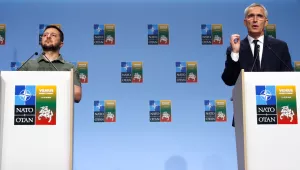Your search did not return any results. Please try another search.
by Nils Olsen, Enitan Okediji and Grace Jones
Reports & Papers
from
Belfer Center for Science and International Affairs, Harvard Kennedy School

Belfer Center
In The News
from
The Conversation
by Grace Jones and Nils Olsen
Reports & Papers
from
Belfer Center for Science and International Affairs, Harvard Kennedy School

Belfer Center
by Nils Olsen and Grace Jones
Article
from
Belfer Center for Science and International Affairs, Harvard Kennedy School

Associated Press
by Grace Jones and Olivia Leiwant

AP Photo/Olivier Matthys
by Grace Jones, Armughan Syed and Sydney Hansen
by Grace Jones, Janet Egan and Eric Rosenbach
Policy Briefs
from
Belfer Center for Science and International Affairs, Harvard Kennedy School

AP Photo/Libkos
by Eric Rosenbach, Grace Jones and Olivia Leiwant
Reports & Papers
from
Belfer Center for Science and International Affairs, Harvard Kennedy School

AP Photo/Mindaugas Kulbis








